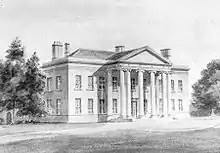Sir Edward Bayntun-Rolt, 1st Baronet
Sir Edward Bayntun-Rolt, 1st Baronet (1710–1800) was a British landowner and Whig politician who sat in the House of Commons for 43 years from 1737 to 1780. His election in 1741 was instrumental in the downfall of Sir Robert Walpole's premiership.
Sir Edward Bayntun-Rolt, 1st Baronet | |
|---|---|
| Born | 1710 |
| Died | 3 January 1800 |
| Nationality | British |
| Occupation | Landowner and politician |
Early life

Bayntun-Rolt was the second son of Edward Rolt of Sacombe, Hertfordshire and his wife Anne Bayntun, daughter of Henry Bayntun of Spye Park. Following the death of his uncle John Bayntun, he succeeded to the Bayntun properties at Spye Park and elsewhere in 1717, and took the additional name of Bayntun. He married Mary Poynter of Herriard, Hampshire before 1743.[1]
Political career
Bayntun-Rolt's estate brought him a major interest in the parliamentary seat at Chippenham. He was returned as an opposition Whig Member of Parliament at a by-election on 22 June 1737. At the 1741 general election he was re-elected with Sir Edmond Thomas, another opposition candidate, after a contest against two government candidates. The two defeated government candidates petitioned and the outcome became a trial of strength between Sir Robert Walpole and his opponents. On 31 January 1742 the petition was rejected by 16 votes. This event led to Walpole's resignation after 20 years as Prime Minister.[1]
Bayntun-Rolt was appointed a groom of the bedchamber to Frederick, Prince of Wales in 1745 but was dismissed in March 1746. At the 1747 general election he was given a secret service grant of £800 towards his expenses. After the Prince of Wales's death in 1751, he was made surveyor general to the Duchy of Cornwall at £466 a year and held the post for forty-five years.[1]
Bayntun-Rolt was again given a secret service grant at the 1754 general election and in 1761, although the Government granted no money for elections, the Earl of Bute arranged a pension of £300 on the Duchy of Cornwall for him. He was created baronet on 7 July 1762. He was returned again as MP for Chippenham in 1768 and 1774. He did not stand in the 1780 general election.[2]
Later years and legacy
Bayntun-Rolt died on 3 January 1800.[2] He was succeeded in the baronetcy by his son Andrew.[3]
References
- "BAYNTUN ROLT, Edward (1710-1800), of Spye Park, nr. Chippenham, Wilts". History of Parliament Online (1715-1754). Retrieved 1 November 2017.
- "BAYNTUN ROLT, Edward (1710-1800), of Spye Park, nr. Chippenham, Wilt". History of Parliament Online (1754-1790). Retrieved 1 November 2017.
- Cokayne, George Edward, ed. (1906), Complete Baronetage volume 5 (1707–1800), 5, Exeter: William Pollard and Co, retrieved 25 February 2019
| Parliament of Great Britain | ||
|---|---|---|
| Preceded by Rogers Holland Richard Long |
Member of Parliament for Chippenham 1737–1780 With: Richard Long Sir Edmond Thomas 1741–1754 Sir Samuel Fludyer 1754–1768 Sir Thomas Fludyer 1768–1769 Henry Dawkins 1769–1774 Samuel Marsh 1774–1780 |
Succeeded by Henry Dawkins Giles Hudson |
| Baronetage of England | ||
| Preceded by New creation |
Baronet (of Spye Park) 1762–1800 |
Succeeded by Andrew Bayntun-Rolt |